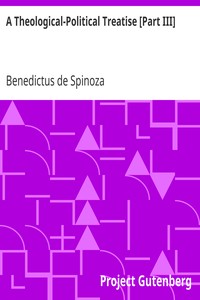| Author |
Spinoza, Benedictus de, 1632-1677 |
| Translator |
Elwes, R. H. M. (Robert Harvey Monro), 1853- |
| Title |
A Theological-Political Treatise [Part III]
|
| Note |
Wikipedia page about this book: https://en.wikipedia.org/wiki/Tractatus_Theologico-Politicus
|
| Note |
Reading ease score: 53.0 (10th to 12th grade). Somewhat difficult to read.
|
| Credits |
Joseph B. Yesselman. HTML version by Al Haines.
|
| Summary |
"A Theological-Political Treatise [Part III] by Benedictus de Spinoza" is a philosophical treatise written in the 17th century, specifically during the Enlightenment period. This work is part of Spinoza's broader exploration of religion, politics, and philosophy, focusing on the relationship between theology and reason, as well as the nature of faith and the role of scripture. It examines these topics through a rational lens, questioning the traditional interpretations of biblical texts while advocating for a rational and ethical approach to religion. In Part III, chapters XI to XV, Spinoza engages deeply with the nature of the Apostles’ writings, suggesting that their epistles were not divinely inspired in the way traditional prophets' messages were. He argues that scripture primarily imparts simple and clear moral doctrines rather than complex philosophical ideas, asserting that faith should be based on obedience and good works rather than intricate theological disputes. Furthermore, he delineates the independence of theology from reason, positing that while theology strives for obedience and piety, philosophy seeks truth. This separation aims to relieve the potential conflicts between faith and rational inquiry, ultimately promoting a vision of religion that harmonizes with reasoned ethical living. (This is an automatically generated summary.)
|
| Language |
English |
| LoC Class |
B: Philosophy, Psychology, Religion
|
| Subject |
Philosophy and religion -- Early works to 1800
|
| Subject |
Free thought -- Early works to 1800
|
| Subject |
Political science -- Early works to 1800
|
| Category |
Text |
| EBook-No. |
991 |
| Release Date |
Jul 16, 1997 |
| Most Recently Updated |
Jan 23, 2021 |
| Copyright Status |
Public domain in the USA. |
| Downloads |
122 downloads in the last 30 days. |
|
Project Gutenberg eBooks are always free!
|

